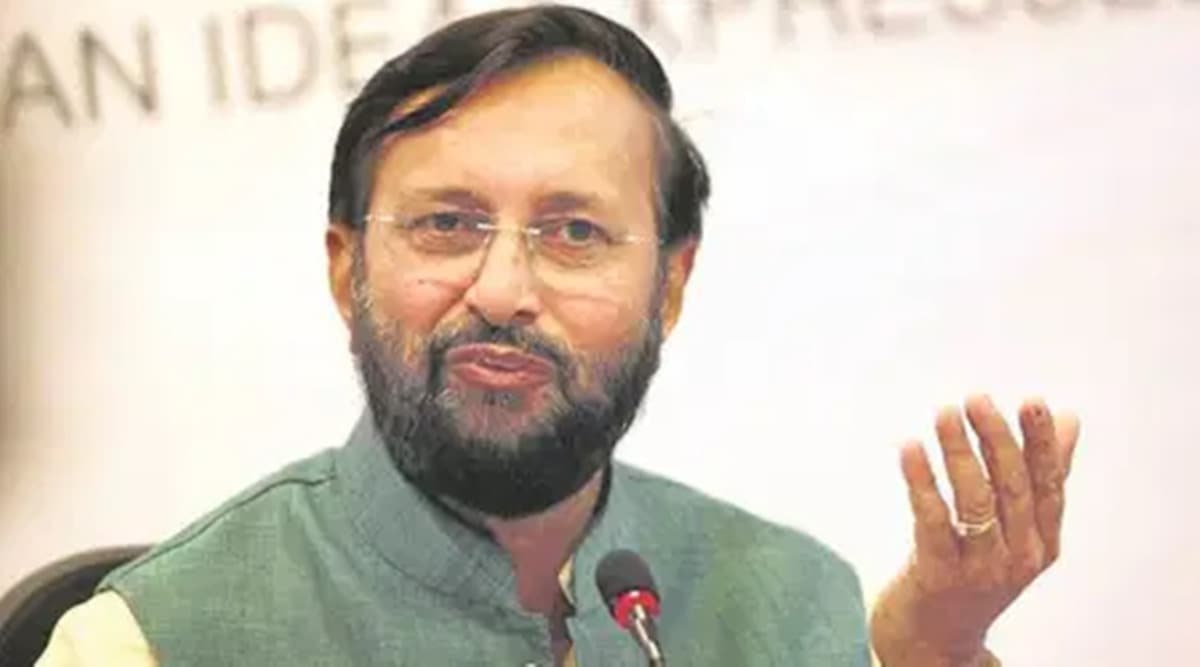 Union Environment Minister Prakash Javadekar. (File)
Union Environment Minister Prakash Javadekar. (File)Microbe-based ‘Pusa Decomposer’ capsules, developed by ICAR-Indian Agricultural Research Institute (IARI) to manage paddy stubble in fields, will be used on a trial basis in Punjab, Haryana, Uttar Pradesh and Delhi this year, Union Environment Minister Prakash Javadekar said Thursday.
stubble burning, farmers stubble burning, Prakash Javadekar, Prakash Javadekar Farmer stubble burning, Delhi news, Delhi pollution
The announcement was made after a review meeting chaired by Javadekar with ministers and officials from four NCR states and Punjab for tackling air pollution in the region during winters, which worsens due to stubble burning.
Javadekar said, “ICAR through its Pusa Institute has developed a decomposer. Trial of this decomposer will be done in all (stubble burning) states. After the trial on thousands of hectares, it will be scaled up in the next year based on results.”
On September 26, Delhi CM Arvind Kejriwal had urged the minister in a letter to encourage stubble burning states around Delhi to use the IARI technology for decomposing paddy straws left in the field after harvest.
Union Ministry officials said the trial will be done on 100 hectares of land in Punjab and Haryana, 800 hectares in Delhi, and 10,000 hectares in UP, which has been experimenting with such technology since three years.
The ‘Pusa Decomposer’ can rapidly degrade paddy straws in the field and convert them into compost, which then does not pose any issues for the sowing of wheat crops, as per IARI scientists.
Institute director A K Singh has said the capsules, containing seven strains of fungi, are to be mixed with water, 150 gms of jaggery and 50 gms of besan, to prepare a 25-litre solution that can be sprayed on 1 hectare of field.
It costs Rs 300 per acre and was licensed to four companies in 2019 and two in 2020.
To quickly clear their fields before planting wheat crops in October and November, farmers in Punjab and Haryana — two main stubble burning states — usually set fire to crop residue left after harvest of paddy. IARI scientists said farmers have about 20-25 days between clearing their fields of paddy straws and sowing wheat crops — enough time for the decomposer solution to work.
Javadekar said as a result of several steps taken by the Centre and states, pollution levels in Delhi have come down and ‘good’ air quality days have increased from 108 in 2016 to 182 in 2019.
He said this year, NCR states have been asked to focus on air pollution hotspots and address problems there. In the meeting, suggestions were given to states on how they can address these problems: “All states were told that Covid affects our lungs, and air pollution also has a bad impact on them. Therefore, air pollution can make (Covid-19) situation more serious. Punjab was told it should educate farmers in high stubble burning areas that their families would be affected first.”
He said the Centre has provided funds worth Rs 1,700 crore to Haryana, Punjab and UP in the last three years for stubble management. Javadekar added that 50 teams of the Central Pollution Control Board will monitor the stubble burning issue this year and review the situation with the states every day.
“There has been reduction in stubble burning in three years, but we have to reduce it further. But this is not the only source of pollution… Even on days when its contribution is 40%, the remaining 60% is from sources, including unpaved roads, waste burning, etc,” he added.
📣 The Indian Express is now on Telegram. Click here to join our channel (@indianexpress) and stay updated with the latest headlines
For all the latest India News, download Indian Express App.